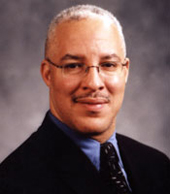NIH Award from the National Institute on Aging
Chicago Health and Aging Services Exchange: Partnering for Research and Service
- Principal Investigator: Eric E. Whitaker, MD, MPH, Executive Vice President, Strategic Affiliations Associate Dean, Community-Based Research
- Start Date: August 15, 2010
- Total Award Amount: $100,000
Public Health Relevance:
The Chicago Health and Aging Services Exchange is an internet-based allocation mechanism that will match people most in need of services with the organization best suited to provide care. The downloadable data from this same site will facilitate social service evaluation and health research. The Exchange is being built by a diverse team of community and university partners for health research.
Project Description:
The South Side of Chicago is a 95 square mile region including 34 of Chicago's 77 community areas, and is one of the nation's largest contiguous urban African American communities (72% of 1.1 million people). Seven of the 8 poorest communities in Chicago are found on the South Side; 5 of these hug the University campus which resides in one of the wealthiest areas of the city. Twelve percent of the population is 65 or older; the largest population of older adults in Chicago resides in Chatham, a South Side community.
Comparing Chicago Department of Public Health 2004 surveillance data to Healthy People 2010 indicators, health of individuals living on Chicago's South Side lags far behind that of the rest of the city and the nation. This is despite the centrally-located University of Chicago campus and Medical Center. Yet, even in the poorest communities, vitality is seen in strong community organizations, robust social networks, rich cultural and faith traditions, and resilient small businesses. This application proposes to leverage the joint assets of the South Side community with the University of Chicago to build transformative, sustainable, community-linked health research infrastructure that also delivers immediate benefit to this population by creating transparency and efficiency in the health and human services sector.
The specific aims leverage institutional, foundation and NIH investments to: 1) Design, build and open to the public, an internet-based information exchange, that matches: a) individuals with health and human services, and b) health researchers and funders with data to monitor and respond to health and human services sector dynamics; 2) Hire, train, deploy and track impact of 3 full-time Community Health Information Exchange Fellows (CHIEFs) who will help build the Exchange, facilitate commitment and uptake, and disseminate findings and knowledge for mutual benefit of all partners; 3) Build an economic sustainability model and plan and metrics for tracking market dynamics including volume, activity, performance, and the geography of supply and demand.
The Chicago Health and Aging Services Exchange will be developed for the South Side of Chicago via a mutually beneficial collaboration between community leaders and university researchers, with input from an Exchange Advisory Board that includes, among many experts, faith leaders, philanthropists, and executive-level representatives from the offices of the Governor of Illinois and the Mayor of Chicago. The vision is to develop a scalable prototype to transform efficiency in the health and human services sector while enhancing community-linked health research capacity on a city, state, and even a global scale. The long-term objective of this work is to build the team, processes, and technology to address a major infrastructural matching problem in the health and human services sector.
This award is funded under the American Recovery and Reinvestment Act of 2009, NIH Award number: 1RC4AG038176-01

Eric E. Whitaker, MD, MPH,
Executive Vice President, Strategic Affiliations Associate Dean, Community-Based Research
